common problems
Attention Deficit Hyperactivity Disorder (ADHD)
Introduction
If you have Attention Deficit Hyperactivity Disorder (ADHD), you may have lots of energy and find it difficult to concentrate. It can be hard to control your speech and actions. ADHD is the most common behavioural disorder in children, and symptoms often become noticeable between the ages of 3–7. We don't know what causes ADHD, but experts think it runs in families. It could also be caused by an imbalance in brain chemicals.
A related condition, ADD (Attention Deficit Disorder) has similar symptoms, but there is less hyperactivity and the main problem is difficulty concentrating.
If you think you are affected by ADHD, talk to someone you like and trust, like a teacher, relative, counsellor or friend. You should also see your GP as they may offer to refer you to CAMHS. There is no test for ADHD so, instead, you'll talk to an expert (maybe a psychiatrist or specialist paediatrician) to find out the best way to help.
HOW CAN CAMHS HELP ME WITH ADHD?
Behavioural therapy, counselling, family meetings, special educational support and medication can all help children and young people with ADHD. You could be offered psychological therapy on a one-to-one basis. Older children may also be offered group sessions to help with their behaviour.
Let's talk about ADHD
What can you do as a parent/carer?
An ADHD diagnosis requires a specialist assessment (by a child psychiatrist or paediatrician). This involves recognising patterns of behaviour; observing your child, obtaining reports of their behaviour at home and at school, sometimes using computerised tests. These can then inform an effective treatment plan so that your child can achieve their full potential.
These are things that can really make a difference:
Go to your GP or school if you are worried that your child may have ADHD. A diagnosis can help you move forwards.
ADHD is a whole-family issue. Make sure that all family members understand what is going on, normalise it and keep a balance of attention in the family.
Avoid giving your child with ADHD the ‘bad reputation’ in the family.
It is important to maintain boundaries and discipline and not put up with bad behaviour like disobedience, swearing or violence.
Ensure you provide a healthy lifestyle with balanced diet, regular physical activity and sleep routines.
Give your child simple instructions – get close, look at them, talk slowly and calmly.
Praise your child when they have done what is required, however small (but be careful not to over-praise).
Write helpful lists and post them up somewhere visible (like on the fridge or back of the door).
Break up necessary sit-down times – such as meals and homework – into smaller, manageable chunks, say 15–20 minutes.
Avoid food additives and colourings; there is some evidence that children with ADHD are particularly sensitive to these. Discuss this with a GP or dietician if you are unsure.
Find out about local parenting programmes and support groups as these can really help support you and your family.
Those who receive specialist treatment tailored to their needs often see real lasting benefits in their learning, friendships, employability and life skills as they understand how best to cope and adapt.
Further support, advice and self-help
ADDISS (The National Attention Deficit Disorder Information and Support Service)
Provides information and resources about ADHD and the variety of approaches that can help including behavioural therapy, medication, individual counselling, and special education provision.
Website | Tel: 020 8952 2800
HCSG (Hyperactive Children’s Support Group) helps hyperactive/ADHD children and their families, providing information particularly regarding hyperactivity and diet.
Website | Tel: 01243 539966 (Mon–Fri, 2:30–4:30pm)
Contact is the national charity for families with disabled children, including those with ADHD, with guidance and information. Local and regional support via postcode search button.
Website | Tel: 0808 808 3555 (Mon-Fri, 9:30am–5pm)
MindEd for Families offers online advice and support.
Website
Young Sibs is a UK-wide online support service for siblings under 18 who have a brother or sister who is disabled or has special educational needs or a serious long-term condition (including ADHD).
Website | Chat Forum
Youth Wellbeing Directory lists of local services for young people’s mental health and wellbeing.
Website
Young Minds offers free, relevant, practical information about a range of mental health issues in children and young people. It has information about feelings and symptoms, conditions and looking after yourself.
Website
Here, you can find a workbook for primary school age children to learn about their ADHD.

